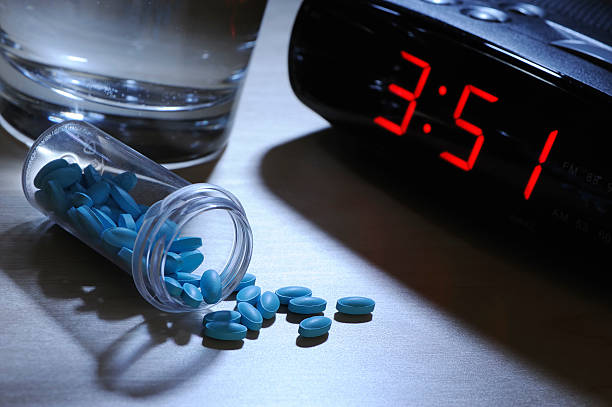In order to get a good night’s sleep, many people take sleeping pills, but they don’t think about the potential risks. If you wonder, “Sleeping pills have a possible overdose?” you may already have developed an addiction. Those who lose track of how many they take or who are unaware of the possible risks run the risk of overdosing on sleeping pills.
What Are Sleeping Pills?
Depressant drugs including sleeping pills. They affect the central nervous system, which slows down how the body works. They are classified as “sedative hypnotics,” and are prescribed to ease anxiety or enable sleep. Benzodiazepines and barbiturates are the two main categories of sedatives.
Some of the more commonly prescribed barbiturates include:
• Luminal (phenobarbital)
• Nembutal (pentobarbital)
Barbiturates were once preferred sedatives, but benzodiazepines have recently taken their place. Among the most commonly prescribed are:
• Ativan (lorazepam)
• Halcion (triazolam)
• Klonopin (clonazepam)
• Librium (chlordiazepoxide)
• Tranxene (clorazepate)
• Valium (diazepam)
• Xanax (alprazolam)
Can You Overdose on Sleeping Pills?
Due to the lower risk of an overdose with the more recent varieties, modern sleep medications are not as potent as earlier generations. Despite these measures to protect people, the answer to “Can sleeping pills be consumed in excess?” is a definite yes.
The popular sleeping pills Sonata, Ambien, and Lunesta are all available with a prescription. Both prescription and over-the-counter sleeping medications have been overdosed on by individuals. Depending on the drug and the person taking it, the dosage level at which an overdose risk exists varies.
Sometimes someone who has consumed a potentially fatal dose of a drug or too much alcohol realizes they are in trouble and can ask for assistance. Due to the user’s extreme sedation or loss of consciousness, sleeping pills pose a higher risk of overdose. Due to their inability to contact help or a loved one if they are alone, the risk of a fatal overdose increases.
How Do Sleeping Pills Affect the Brain?
The neurotransmitters, or brain chemicals that control sleep, are affected by sleeping pills. In the event that too many are taken, this may lead to an overdose of sleeping pills. Sleeping pills work by slowing down brain activity and depressing the central nervous system, which results in drowsiness. They are typically applied in the short-term management of sleep disorders or insomnia. Only use sleeping pills as prescribed by a doctor because they have a high potential for addiction.
Ambien, Lunesta, and Sonata are a few examples of popular sleeping pills.
• Tablet-shaped sleeping aids called Ambien are available. It is a hypnotic-sedative medication that reduces brain activity.
• Lunesta: Lunesta is a sleeping aid that comes in tablet form.
• A sleeping aid that is available in tablet form is called Sonata. The drug is a sedative-hypnotic that works by reducing brain activity.
Signs of a Sleeping Pill Overdose
Signs of an overdose might be disregarded by the person who took the sleeping pills or someone nearby. The person may lose consciousness or become very lethargic, leading them or others to believe they are simply feeling the medication’s effects.
A person wondering, “Can you take sleeping pills in excess?” because they suspect they may have taken too many may experience difficulty breathing or slowed breathing. While they wait for emergency medical assistance, someone nearby can perform cardiopulmonary resuscitation (CPR) on them to help them recover.
Abdominal pain, constipation, and other digestive discomfort are additional indicators of a sleeping pill overdose. Additionally, the individual may have trouble balancing or walking. Others might mistake them for intoxicated and fail to notice that they have taken an excessive amount of sleeping pills.

What to Do If You Suspect An Overdose on Sleeping Pills?
Call 911 right away if you suspect a sleeping pill overdose. A sedative-hypnotic drug like Ambien, Lunesta, or Sonata can depress the central nervous system to the extent that breathing becomes challenging if taken in excess.
It’s best to seek medical attention just in case, even though the overdose might not be fatal. If not immediately treated, an overdose of a sleeping pill can be fatal. Until assistance arrives, make an effort to keep the person awake and talking. Put the person in the recovery position if they are unconscious and wait for assistance.
However, some people do experience serious complications from a sleeping pill overdose, such as:
• Coma
• Respiratory depression
• Cardiac arrest
• Death
• Seizures
• Loss of consciousness
How is Sleeping Pill Addiction Treated?
Someone who abuses sleeping pills and is unable to stop taking them needs professional assistance, just like with any other drug addiction. A program for detoxification is the first step in treatment. Through detoxification, the body can get rid of the toxins that have accumulated due to the addiction. Because there is a chance of harmful and even fatal side effects when a person stops using sleeping pills, detox should never be attempted alone.
After detox, many people enroll in a residential program, which entails residing in a center for the treatment of drug and alcohol addiction. There are other people who can transition from detox to outpatient care. Individual and group therapy, holistic therapy, and other treatment modalities are all included in outpatient care. The person receiving outpatient treatment can remain at home while undergoing two to five days of outpatient care per week.
Teaching the patient how to sleep without the risky narcotics they previously used is a key component of a sleeping pill addiction treatment plan. Many people who suffer from addiction also have one or more mental illnesses. The treatment of addiction and mental illness go hand in hand in both residential and outpatient facilities. A person’s need for sleep medication can be decreased with treatment.
Summary
In general, if treatment is initiated quickly after an overdose of sleeping pills, patients can recover. The effects of the overdose typically last only as long as the drug is still in the body unless a person has endured prolonged oxygen deprivation.
